Honorable Mention #1: Stonehoof Chieftain
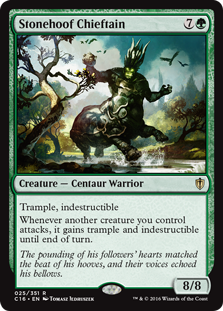 Just like you’ll never find a set where Blue doesn’t draw and Black doesn’t eradicate, so too is it that you’ll be hard pressed to come across a situation where Green isn’t given the opportunity to pummel its opponents.
Just like you’ll never find a set where Blue doesn’t draw and Black doesn’t eradicate, so too is it that you’ll be hard pressed to come across a situation where Green isn’t given the opportunity to pummel its opponents.
The newest edition to this arsenal is the imposing Stonehoof Chieftain. While an expensive investment at eight mana, you certainly get what you pay for in a hulking 8/8 creature with both indestructible and Trample – a potent combination if there ever is one.
Then if that isn’t enough, Stonehoof goes all super Brawn by giving your other attacking creature you control those same two abilities, turning your entire army into a damage-dealing with near-complete impunity. While it doesn’t pack the same buffing bonuses of last year’s Pathbreaker Ibex or 2014’s Thunderfoot Baloth, gaining temporary indestructibility can be equally as useful depending on your ambitions.
It’s not the most creative card in existence. What it is, however, is a scary creature to face on the other side of the board as it can single-handedly turn even a modest force into one no one wants to see barreling down at them.
Honorable Mention #2: Deepglow Skate
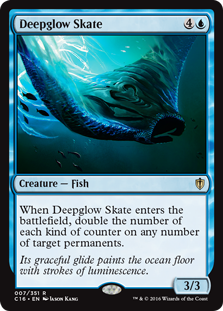 Have you ever wished you could see Doubling Season turned into a creature? Did you ever envision it would be as a fish? Because that’s what you’re getting here.
Have you ever wished you could see Doubling Season turned into a creature? Did you ever envision it would be as a fish? Because that’s what you’re getting here.
It’s been long stated that in the era of planeswalkers Doubling Season would be too problematic to reprint in a normal set. (We should be so happy we even got a single reprint with Modern Masters.) Instead, we have gotten a series of cards over time with similar effects on a smaller scale, such as Primal Vigor, Parallel Lives, and Vorel of the Hull Clade, always careful to avoid repeated effects that could double the silly power-level issues of doubling planeswalker loyalty counters. Deepglow Skate is the continuation of that idea, except that this time…it does power up your Superfriends.
Make no mistake, Deepglow Skate is a highly flexible creature for many decks, letting you double nearly any kind of counter you can think of, from storage counters on lands, +1/+1 counters on creatures, or charge counters on artifacts. But most people – and rightfully so – are going to look at it and think planeswalkers, especially as this doubling effect is in Blue instead of Green. It may only be a one-time effect (by itself), but with the right permanents on the board there is nothing fishy about how effective a well-timed use of this creature can be.
Honorable Mention #3: Saskia the Unyielding
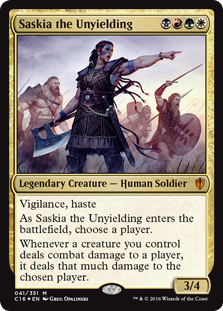 Of the five new four-color creatures added to the game with Commander 2016, two in particular stand our for their wide application use. One of them lies further down the list. The other one is Saskia.
Of the five new four-color creatures added to the game with Commander 2016, two in particular stand our for their wide application use. One of them lies further down the list. The other one is Saskia.
Saskia makes for a fairly intriguing creature in EDH games where one player is particularly difficult to attack head-on for one reason or another; this card gives you the ammunition to take them on indirectly. When Saskia enters the battlefield, you are essentially marking another player to take damage whenever one of your creatures attacks any of your opponents. If you can’t attack Player A directly, this allows you to attack another player and still do damage to them. And if you can attack that person you’re effectively dealing double damage. It’s sort of like Curse of Bloodletting, except that it only affects damage you’re doling out.
Likewise, we’ve seen a similar effect with Hydra Omnivore, but unlike the hydra or Aura, Saskia allows you to zero in on a specific problematic opponent with your creatures without the danger of either inciting everyone to pile on to a specific player or being so indescriminate that you risk antagonizing opponents you hadn’t meant to. Saskia is one of the more subtle new Commanders debuted, but its possible political implications at an EDH table are full of potential. Indeed, it allows you to come at a more defensive-minded opponent sideways in a way they likely won’t be prepared for.
Number Ten: Boompile
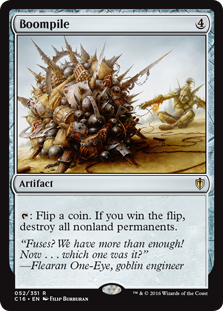 Magic has never lacked solid, dependable board wipes. Commander sees more than its fair share of them too, as they’re a reliable tool in multiplayer games for hitting the reset button when someone gets too far ahead or too far behind. Wipes are found in every color to some degree, and if a color doesn’t have access to the specific kind of board wipe you’re looking for, then we turn towards the short but well-established list of artifact-based destruction.
Magic has never lacked solid, dependable board wipes. Commander sees more than its fair share of them too, as they’re a reliable tool in multiplayer games for hitting the reset button when someone gets too far ahead or too far behind. Wipes are found in every color to some degree, and if a color doesn’t have access to the specific kind of board wipe you’re looking for, then we turn towards the short but well-established list of artifact-based destruction.
Of those, none stand out more than the classic and iconic Nevinyrral’s Disk. Fitting in any deck, the Disk is cheap, effective, splashable, and will destroy most of your problems. In some ways, it’s almost too good, as far as variety goes.
That said, it does have two drawbacks. The first is that it doesn’t take out planeswalkers. The second, and more important, is that it enters tapped, meaning it has to last a round before it can go off. Unless you want to double the mana investment for Oblivion Stone though, its cost efficiency always makes it worth that gamble.
Boompile takes that gamble one step further by giving you another all-inclusive board wipe capable of going in any deck for just four mana. The catch is that it only has a 50% chance of going off when you need it to. Not everyone is going to like those odds, true, but if you’re ok with chancing it, Boompile is the cheapest all-encompassing sweeper out there – especially for off-color permanent destruction. And hey, 50% of the time, it works every time.
Number Nine: Thrasios, Triton Hero
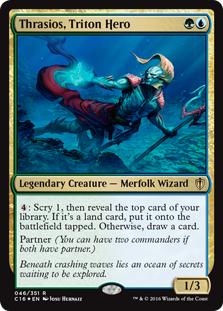 A particular mark of a good designer is the ability to offer an old idea repackaged in such a way that it feels like you’re still getting something new. That is precisely what you get here. Thrasios is next in a series of cards we’ve seen in different forms before.
A particular mark of a good designer is the ability to offer an old idea repackaged in such a way that it feels like you’re still getting something new. That is precisely what you get here. Thrasios is next in a series of cards we’ve seen in different forms before.
That said, it doesn’t mean it’s not worthwhile. At its worst, this is effectively a creature-based version of Candles of Leng, giving you a 1/3 creature for two mana with a built-in ability to pay four to draw a card.
However, it also throws in the rider that the drawn card can go right into play if it’s a land, giving you the ability to get out land or draw into useful cards quickly. Coiling Oracle has this effect as a one-time trigger and is considered a worthwhile EDH card in its own right while Skyward Eye Prophets turned the “free land” rider into a tap ability. And ta da! Now Thrasios makes it a repeatable effect for every four mana.
The cost to use may sound prohibitive, but don’t discount the ability to sift through your deck in the later stages of the game. This card can certainly do that – especially with its Scry bonus – making it more useful than it may first appear. There’s no shortage of useful things this merfolk could unearth; that’s doubly true if it’s used as a Commander itself.
Number Eight: Conqueror’s Flail
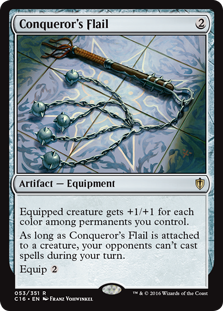
When compiling a list of ways to prevent your opponents from mucking with your turns, few things are more effective than simply preventing your foes from being able to do anything in response to your actions.
It’s not a new idea. Magic has toyed with different ways to stop someone from stopping you as far back as Visions’ City of Solitude. In the world of Commander, though, the most emblematic face of Not Gonna Happen is Grand Abolisher. Although it’s not the biggest creature around, few other two-drops can cause as many tactical headaches as someone sitting with an Abolisher out. Anyone who has faced one knows the frustration of being unable to react to anything that player does, often to their detriment. It’s one real weakness, of course, is that a 2/2 creature is generally an easy removal target.
This Flail solves that problem by turning any creature of yours into a cleric-in-training, which is beyond advantageous. While the Flail doesn’t give the same shield defense for activated abilities as Grand Abolisher (similar to Dragonlord Dromoka), the tradeoff of being able to stop all manner of reaction spells from spot removal, to Fog effects, to counterspells, regardless of which creature you have out, is well worth it.
Plus, this affordable little equipment also fixes the Abolisher’s other problem by providing a creature buff as well. Which, given the ability’s effectiveness, it very well may need.
Number Seven: Faerie Artisans
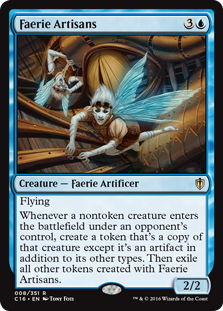 Unless you’re new to Magic it’ll come as no surprise the significant uptick of Enter The Battlefield triggers over the last few years. Reflecting a design shift away from ‘complex’ cards at lower rarities (i.e. those with upkeep costs or abundant tapping abilities), ETB triggers are explored in great detail nowadays. There are so many useful ETB effects that entire deck archetypes have sprung up to take advantage of them – which we’ve talked about before.
Unless you’re new to Magic it’ll come as no surprise the significant uptick of Enter The Battlefield triggers over the last few years. Reflecting a design shift away from ‘complex’ cards at lower rarities (i.e. those with upkeep costs or abundant tapping abilities), ETB triggers are explored in great detail nowadays. There are so many useful ETB effects that entire deck archetypes have sprung up to take advantage of them – which we’ve talked about before.
Their only limitation is, of course, that they only work when the creature initially enters play. Thus, if you want to take advantage of a creature’s effect more than once, you either need it to leave and re-enter the battlefield or to make a copy of it.
Faerie Artisans takes the latter option and embraces it in full fae-like fashion. Any time a creature card hits the board, you gain a temporary copy of it. That could be yours, an opponent’s – it doesn’t matter. That copy’s lifespan is only as good as its toughness, or until something else comes along, so they aren’t much good if you’re trying to Clone something particularly useful for the long term. Instead these mischievous faeries give you the means to take advantage of every ETB effect that transpires, for better or worse. From this perspective, it doesn’t matter that all but your newest copy gets poofed from existence since even just a couple triggers will easily justify this card’s usefulness.
Number Six: Ludevic, Necro-Alchemist / Orzhov Advokist
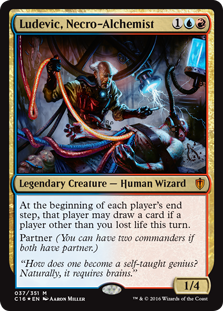
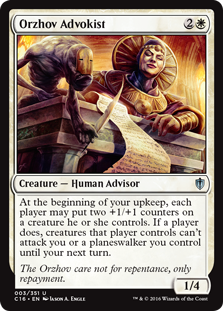
This pair of political creatures shows how different colors can approach a similar idea from differing angles. In this case it’s trying to deter your opponent from attacking you. Both Blue and White are the defensive colors, so it’s no surprise to see new options here. Besides, it’d get boring just reprinting Propaganda / Ghostly Prison over and over.
Although both cards seek the same ends, they do go about it different ways. Ludivec – for all of the talk about his card not really fitting the character – is basically the Blue / Red version of Edric, Spymaster of Trest. This method doesn’t prevent someone from attacking you. Rather, it merely rewards players when they damage anyone but you. One thing it has over Edric btw: Ludivec deters all life loss, not just creatures.
Orzhov Adkokist similarly rewards other players for not attacking, albeit in a more proactive way. Instead of card draws, the church offers every opponent a deal: get a pair of +1/+1 counters in exchange for leaving you alone. The choice will be up to them, making it very reminiscent of Commander 2013’s Tempting Offer cards. It may not be enough of a bribe for everyone to spare you – or your planeswalkers – forever, but much like Propaganda, unless they’re intent on doing you harm it’s an easy incentive for an opponent to continue their indifference. And hey, at the worst you’re still getting two counters on a creature every round.
